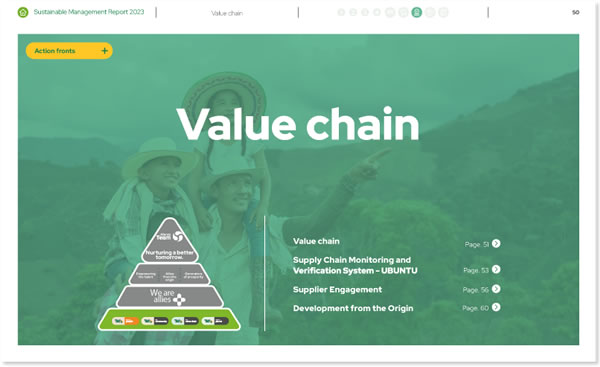Report 2023











Ensuring the alignment and implementation of our principles and values described in the Policy Guidelines throughout our supply chain, we seek to generate positive impact to both the environment and society through the management of risks and opportunities, respect for Human Rights, planetary boundaries and ecosystemic services. We work hand in hand with global experts, customers, suppliers, non-profit organizations and academia, among others, to achieve positive and lasting transformations in the areas of influence of our supply chain that generate lasting economic, social and environmental value.
Due to the fact we do not have our own crops and we source different ingredients, products and supplies in different geographies, we know that this is the area where we are most exposed to the possible materialization of risks. As one of the most relevant issues for the organization and our stakeholders, from the Responsible Sourcing Strategy we focus our actions on three fronts: monitoring and verification of our chains, prioritizing agricultural chains; supplier management through individual accompaniment plans; and transversally, in developing developing initiatives from the origin that seek to promote good practices, mitigate risks, and strengthen the performance of our chain in an integral manner.

To have a complete mapping, diagnosis and risk analysis of the three prioritized chains, achieving 100% traceability to the origin for palm and to the mill for soybeans.
Consolidate a robust complaints and grievance mechanism for all stakeholders that is known, reliable and effective.
Implement at least one social and environmental transformation project with a landscaping approach working alongside strategic allies.
Complete the diagnosis of critical ingredients and contaminants for 100% of our products to draw up transformation plans in line with scientific consensus.
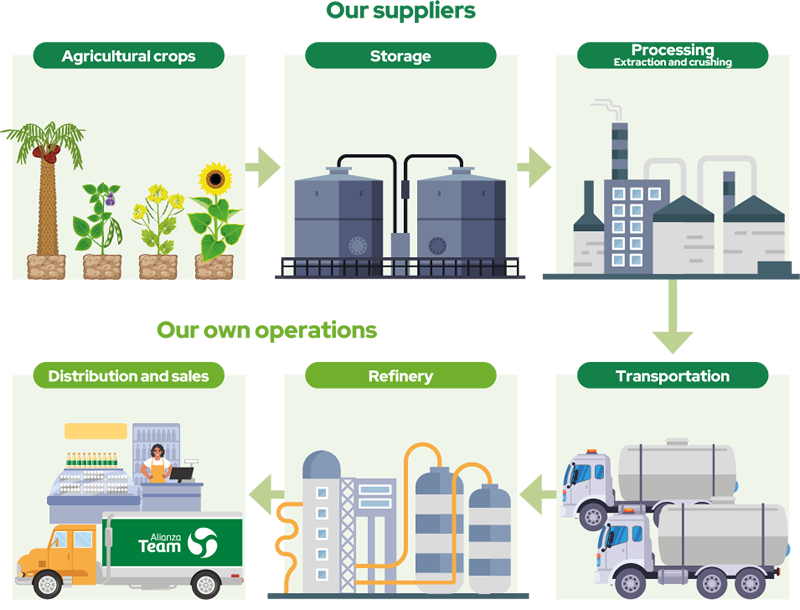
We ensure the competitiveness, availability, quality, timeliness and sustainability of raw materials for our businesses through different specialized teams, who lead the supply of raw materials and the purchase of packaging materials, supplies, ingredients, non-productive elements and administrative services locally under the guidelines of the organization, optimizing processes and times
By evaluating environmental, social and governance aspects throughout our agricultural supply chains, we are able to identify different risks and opportunities, with a focus on the territory ,both our direct and indirect suppliers, producers, communities of influence and their relationship with nature.
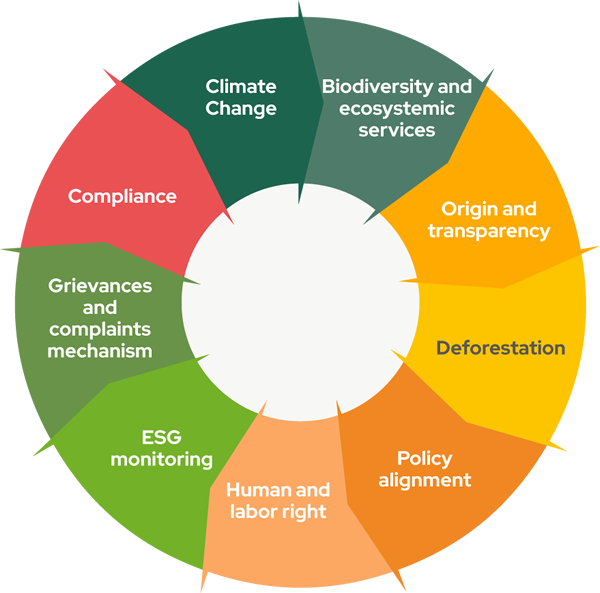
We strengthened the Policy Guidelines and the Supplier and Contractor Code.
We expanded the scope of the organization's due diligence process to include environmental and social aspects for palm and soybean suppliers and began updating our human rights due diligence in our own operations and supply chain to strengthen internal practices and controls in this area.
We continued to make progress in strengthening our complaints and grievances mechanism - the Integrity Line - as well as the construction of the non-conforming supplier procedure.
We updated the prioritization of responsible sourcing chains: palm, soybean and sunflower.
We began the path to have a net positive impact on biodiversity, under a comprehensive and large-scale approach that protects the human rights of communities in the territory and access to natural resources, both in our operations and in our prioritized supply chain with the United Nations Convention on Biological Diversity (CBD).
We are moving forward with the objective of achieving 100% traceability to origin and zero deforestation in the palm and soybean chains by the year 2025.
For the palm chain, we achieved 98% traceability in Colombia, 95% in Mexico and 100% in Chile and extended satellite monitoring and verification of deforestation to 100% of our supply chain with the Starling Tool.
We investigated and closed 100% of the deforestation alerts identified, concluding that there was no deforestation within our suppliers' palm crops and their supply chain.
We will close 2023 with 92%of our palm oil supply free of deforestation. The remaining 8% stems from one of the following factors: the clouse of previously identified alerts, whose impact will be reflected in the next report provided by Starling at the end of Q1 2024; the incorporation of new traceability information, which is currently being processed; or the presence of some farms with pending traceability information at origin.
For the soybean chain, we improved the traceability management system and built the Soy CRM tool for risk and impact management, and we are above 90% in traceability to country of origin, traceability to refinery and traceability to mill or crushing facility for both beans and oil.
We established the Corporate Zero Deforestation Committee, which will ensure compliance with our commitment to zero deforestation.
We began the construction of customized work plans with suppliers with the objective of promoting good agricultural practices focused on the following strategic axes:

Compliance with, and promotion of human rights

Supporting community development

Resilience for mills and producers

Promotion and strengthening of regenerative agriculture practices

Biodiversity protection and conservation


Visit to prioritized suppliers

Socialization and communication of results

Establishment of action plans and follow-up


Visit to prioritized suppliers

Socialization and communication of results

Establishment of action plans and follow-up
We observed significant progress and alignment on our suppliers' no deforestation, peatland development and labor exploitation (NDPE) and human rights (HR) commitments.
We achieved Silver status overall and Gold in 5 criteria of the Sustainable Production Framework, a Nestlé initiative supported by Proforest. This framework assesses organizations' management in human rights and environmental due diligence, in their own operations and supply chain.
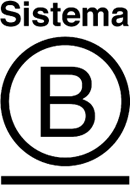
Established the System B - Impact Assessment as the mandatory ESG program for all our company's strategic suppliers, complementing the existing selection, assessment and reassessment processes, assessing 39.17% of these at corporate level (56.39% in Colombia; 48.35% in Mexico; 17.11% in Team Foods Chile; 16.92% in Bredenmaster.
We were recognized by Sistema B in 2023 for being
The organization with the largest supply chain in Latin America, we were invited to raise awareness and measure our triple impact through the aforementioned program.
The second best performing organization in Colombia with respect to the total number of suppliers evaluated.
An organization committed to the transition to a sustainable supply chain in 3 different countries.
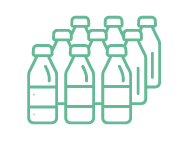
We dedicated more than 600 hours to train and align employees -including 61 purchasing leaders- and suppliers on the organization's sustainability objectives, the ESG program for suppliers, and the role to be played by each party to achieve them.

At BredenMaster, the first "Procurement Day" was held with our suppliers, where they shared the achievements accomplished during the year 2023 in the business and in the "Impact Assessment evaluation, while also socializing the commitments established by the company in terms of sustainability.
Mandatory communication and establishment of a minimum score for suppliers; Articulation of the evaluation results with the School of Allies for capacity building of our strategic suppliers.
80% of strategic suppliers evaluated with B Corp through the Impact Assesment program.
100% of strategic suppliers evaluated with B Corp through the Impact Assesment program.
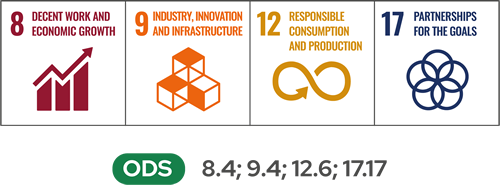
We value the construction of long-term relationships based on trust, promoting good practices and contributing to the development and building of capacities through initiatives and projects alongside our allies to generate shared value.
Working with our agricultural suppliers, we developed projects that contribute to economic development and improve the quality of life of the communities, as well as to the conservation of the environment.
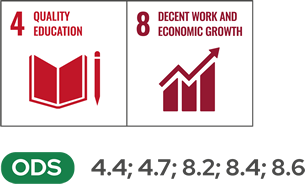
Since its inception in 2020, this unique network connects students and university professors, our employees, customers, special partners and suppliers, with the aim of creating knowledge circuits that strengthen capacities for all, promoting exemplary practices in the environmental, social and economic fields throughout our supply chain. Learn more about this initiative here:

We have dedicated almost 9000 hours to working with more than 100 students and 80 company employees in this program, sharing knowledge and experiences in various topics, maintaining a satisfaction rate above 95% for all participants.

We included new partners in the School by joining PepsiCo's Environmental Cycle, and strengthened ties with other important partners such as CECODES, Solidaridad, Amazóniko and different Chambers of Commerce.

We have managed to involve and keep suppliers from 100% of the organization's prioritized chains in the School.
AWe progressed in the development of our commitment to Regenerative Agriculture, developing two projects that contribute significantly to the protection of biodiversity, the promotion of sustainable agriculture and ecosystem health.
We began a project aimed at promoting regenerative agriculture practices in Colombia in order to measure, promote and support the implementation of sustainable agricultural practices in the company with Peterson Projects and Solutions for a selected group of fruit producers.
We continued working on a project to identify environmental and social risks in the supply chain of Extractora Sur del Casanare (ESC), carried out in collaboration with Fundación Proyección Eco-Social, which focuses on the management of economic, environmental and social risks in its supply chain.
We successfully completed the Entrepalmeros project with the certification of the first group of 41 small-scale palm growers under the RSPO smallholders standard, the first in Latin America and the second in the world to meet all standards.
We participated in the Juntos por la Sostenibilidad event, where we shared experiences and lessons learned and reaffirmed our commitment to the inclusion of small-scale producers in our supply chain.
We participated in the EUROCLIMA+ program to strengthen the monitoring, reporting and verification system for the Zero Deforestation Agreements, through which we were able to survey 82 geospatial polygons of palm fruit producers, covering 51 producers and 32,248 hectares.
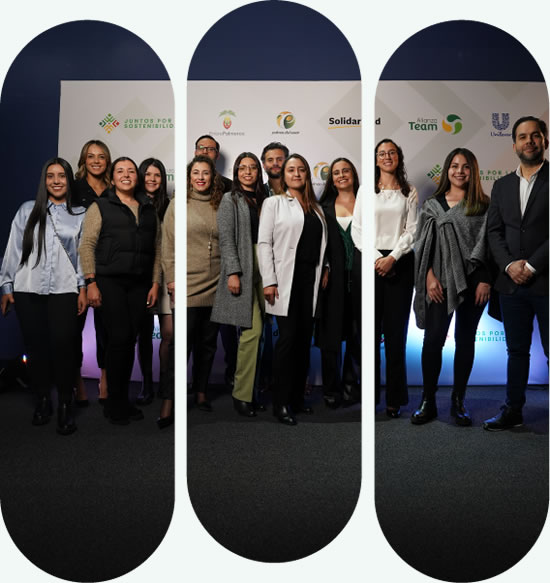
During 2023, we engaged in various projects and collaborations focused on promoting respect for human rights, corporate sustainability and responsible sourcing in our supply chains.
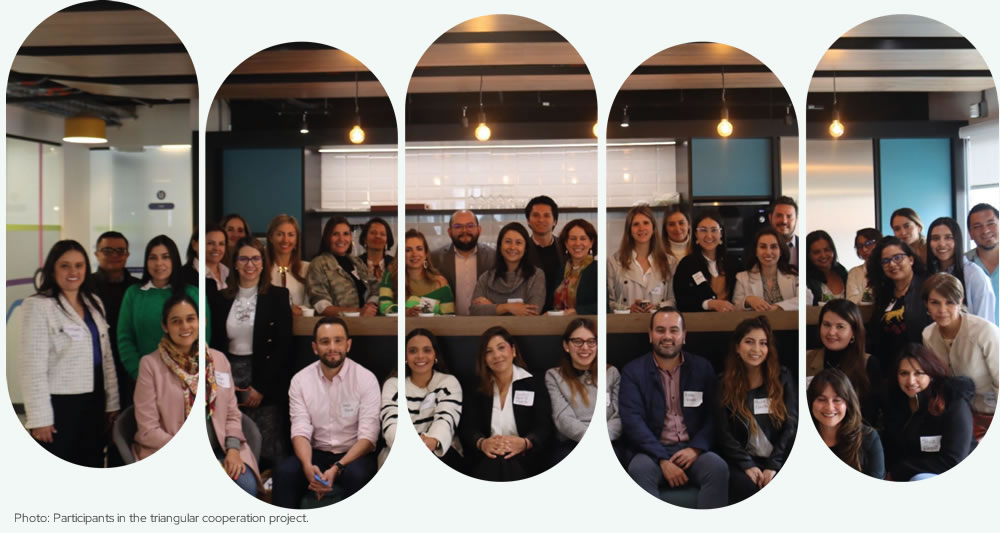
We were part of the Triangular Cooperation Project implemented by the German Development Cooperation (GIZ) through the Alliance for Integrity project, with the support of the Colombo-German Chamber of Industry and Commerce - AHK Colombia, and the Mexican-German Chamber of Industry and Commerce - CAMEXA, participating in the Train of Trainers workshop with the objective of transferring good practices in human rights and due diligence in Colombia, Mexico and Germany. In 2024, we will continue to strengthen these capabilities by joining the network of company trainers in Colombia and Mexico under the Alliance for Integrity's "DEPE" methodology.
We confirmed our participation in the Global Compact’s Business & Human Rights Accelerator of the, seeking to strengthen our knowledge of human rights due diligence and identify strategies to establish more effective corporate action plans.
PWe participated in the POCG LATAM, where we shared experiences, strengthened relationships with industry partners and promoted responsible practices.
We partnered with WWF in order to strengthen our Responsible Sourcing Strategy, using the Accountability Framework Initiative - AFI methodology to achieve zero deforestation in our priority chains.
